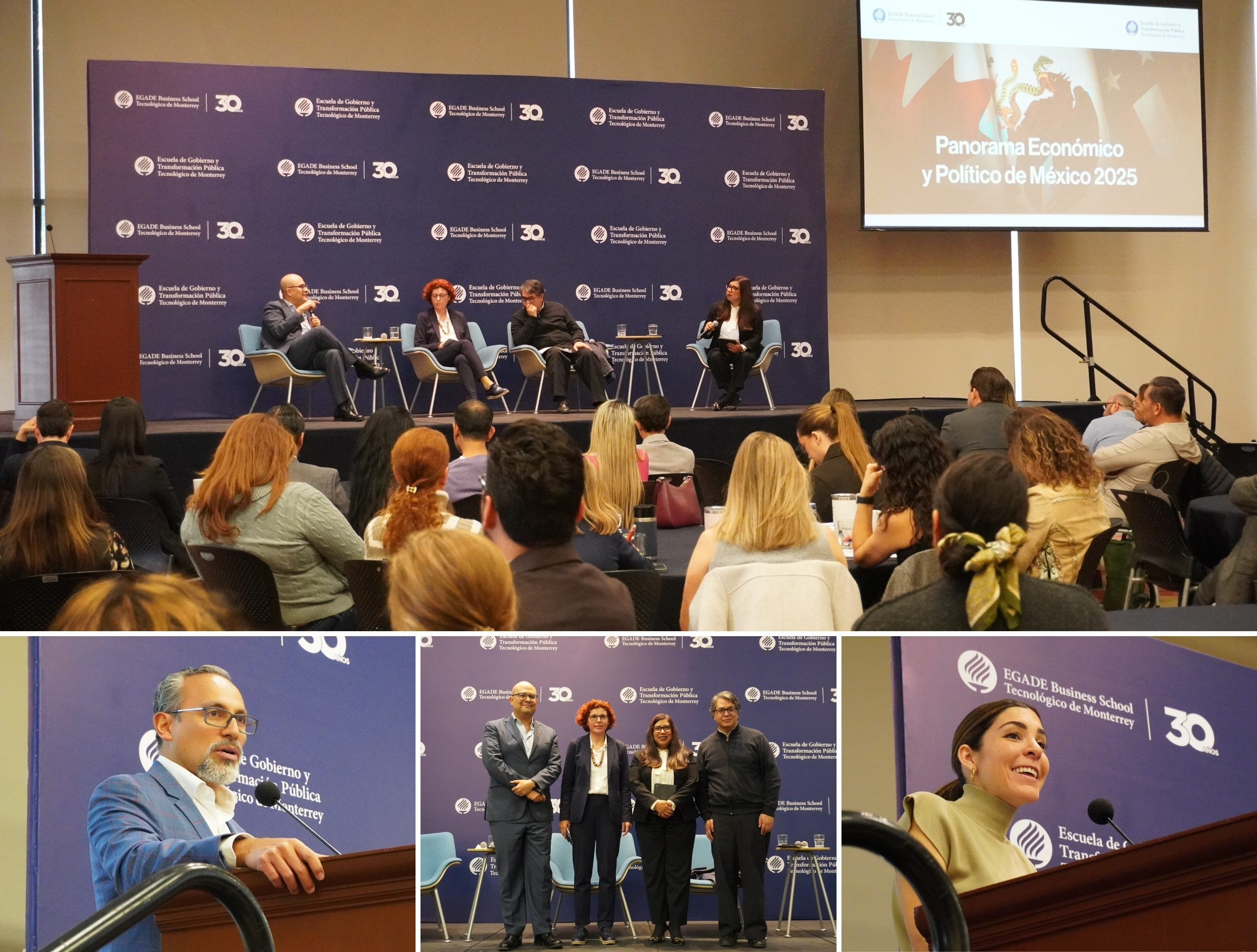In Guadalajara, experts warn that the international landscape has changed irreversibly, requiring Mexico to redefine its foreign and economic strategy.
By JOSÉ ÁNGEL DE LA PAZ | EGADE BUSINESS SCHOOL
Opening the year celebration of its 30th anniversary, EGADE Business School of Tecnológico de Monterrey, in collaboration with the School of Government and Public Transformation (EGyTP), hosted the event "Economic and Political Outlook for Mexico 2025" in Guadalajara, where experts analyzed the country's challenges and opportunities in the new global context.
At the forum’s opening, Raúl Montalvo, director of EGADE Business School Guadalajara, emphasized the importance of fostering strategic dialogue at a crucial moment for the country and the world.
“This year marks the beginning of many changes—new administrations, new circumstances, new geopolitical dynamics—all of which invite us to reflect on the role we play, individually and collectively,” he stated.
Montalvo pointed out that Mexico’s economy faces significant challenges but also opportunities. He highlighted Plan México, which aims to position the country among the world’s top ten economies by 2030. This requires sustained growth of 6% per year, well above the 0.8% average of recent years. He stressed the need for a strategic approach to driving economic development in the face of global uncertainty.
ECONOMIC TRANSFORMATION AND STRATEGIC OPPORTUNITIES FOR JALISCO
The event, held on January 29 at the Congress Center of Tec’s Guadalajara Campus, featured Cindy Blanco, the Secretary of Economic Development of Jalisco. She presented her perspective on the state's economic agenda in the context of global transformations.
In her speech, Blanco highlighted the shift in the world order, the impact of the U.S.-China rivalry, and strategic opportunities for Jalisco.
She noted that global competition demands a more ambitious approach to attracting investment by creating jobs and fostering intellectual property and technology transfer.
“If we want Jalisco to be an ‘investment oasis,’ we must ensure a business-friendly environment,” she stated.
Regarding Jalisco’s economic plan, she identified five key sectors with high potential for the state:
- Software and Information Technology, where Jalisco has been an innovation hub since the 1990s.
- Semiconductors and electronics, an industry in which the state already accounts for 70% of national activity, offer an opportunity to reconfigure global supply chains.
- Agroindustry, focusing on decentralizing economic development across the state’s 12 regions.
- Health and Medical Tourism, leveraging the growing demand for accessible healthcare from the United States.
- Automotive is not in traditional manufacturing but in the development of future mobility technology, with software and semiconductors as key differentiators.
Blanco also stressed that regulatory improvements are essential for Jalisco to solidify itself as an investment destination.
“We can offer land and train the workforce, but without clear rules and a business-friendly environment, investment won’t come,” she warned.
MEXICO AMID GEOPOLITICAL UNCERTAINTY
The event also featured a panel discussion on Mexico’s political and economic outlook with experts from Tecnológico de Monterrey.
Beata Wojna, former Polish ambassador to Mexico and professor of International Relations at the Tec, highlighted that the Claudia Sheinbaum administration seeks to maintain stability in its relationship with the United States. It avoids direct confrontations and cooperates on key issues such as migration and security.
“We shouldn’t take Trump’s statements at face value. One day, he says the relationship with Mexico is fine, and the next, he threatens sanctions,” she cautioned.
Alejandro Díaz, research professor at the EGyTP, noted that Mexicans perceive Trump as more aggressive than in his first term. While most believe the government has acted with prudence, they also demand a stronger response.
“Mexico must prepare for high-volatility scenarios. We can’t wait to react once the damage is done,” he emphasized.
Roberto Durán, research professor at the EGyTP, explained that the geopolitical landscape poses challenges for Mexico’s economy, mainly due to U.S. pressure to reduce China’s presence in the region.
“If uncertainty with the United States isn’t resolved, the Plan México will struggle to move forward,” he stated, emphasizing the need for a clear strategy.
Finally, Azucena Rojas, Dean of the Western and Northern Region of the Tec School of Social Sciences and Government, who moderated the discussion, concluded that Mexico must adapt to a reality in which geopolitics plays an increasingly decisive role and move away from its traditional policy of ambiguity.
“The world of geopolitics is one where choices must be made, and that doesn’t align with Mexico’s traditional political culture,” she remarked.
Experts agreed that 2025 will be a complex year for Mexico, with key decisions shaping its position in the new global order.
The "Economic and Political Outlook for Mexico 2025" event was previously held in Monterrey on January 23 and in Mexico City on January 27. Its final session is scheduled for January 31 in Querétaro.
